IWD: Mel Marshall On Some Dark Days, Beijing Agony & Her Message To Peaty After Rio Glory
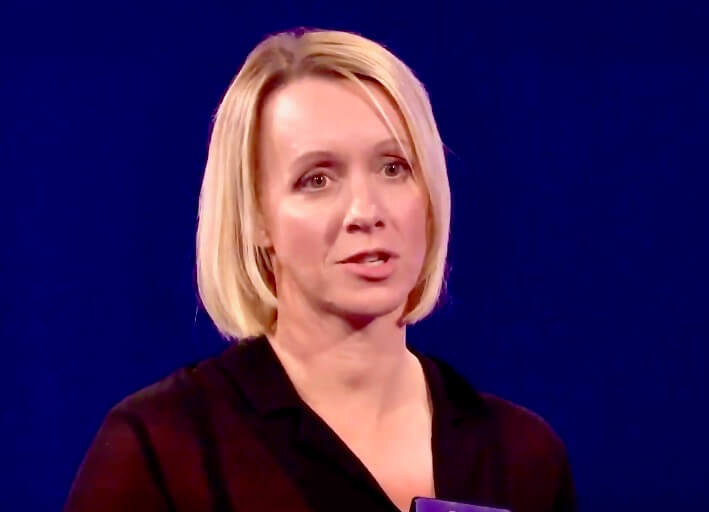
International Women’s Day (IWD)
To mark International Women’s Day, Swimming World will roll out a series of features this Sunday to highlight the achievements and work of pathfinders in swimming and raising issues that continue to have a massive impact on women in sport.
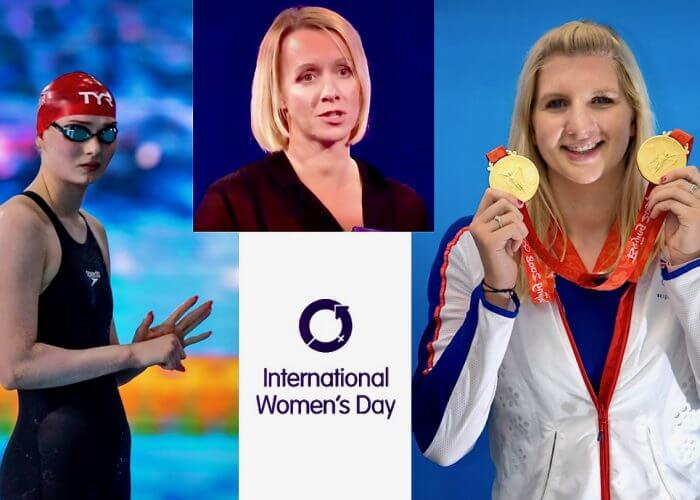
Brit Girl Power (l-r): Freya Anderson, Melanie Marshall, Rebecca Adlington – Photo Courtesy: Anderson () Marshall () and Adlington with her double Olympic golds of Beijing 2008 (Patrick B, Kraemer ©)
So far in our celebration of IWD 2020:
- IWD: A Season Of Plenty For Debbie Meyer -Memories Of Momentum & Magnitude
- IWD – The Day Janet Evans Went A 4:03 Over 8 Laps To Legendary Status
- IWD – Becky Adlington On Four Olympic Medals, Being Speechless In Beijing & ‘Ultimate Athlete’ Ledecky
- IWD -Freya Anderson On London 2012 Lighting The Fire, Beating Her Idols & Embracing Nerves
- IWD -When Cate Campbell Called Out ‘Arrogant’ FINA Leaders For Losing Sight Of Athletes In Pursuit Of Money
- IWD – Takeoff to Tokyo: Fraser’s Trifecta In Tokyo Capped the Dawn of Greatness
- IWD – 2020s Vision: Dr. Shane Gould On Swimming Culture After A Lifetime Of Learning
- IWD – Nancy Hogshead-Makar, Rape Survivor & Fighter For An End To Abuse in Sport
Here we consider Mel Marshall, the woman who has guided Adam Peaty to his extraordinary achievements where he has entered realms unknown and left men’s breaststroke in his slipstream.
Marshall was herself a double Olympian and concluded her competitive career in the pool in 2008 with world, European and Commonwealth medals including six at the 2006 Games in Melbourne.
Marshall reflects on her own Olympic career, some dark days and her journey with Peaty to the top of the Olympic podium.
It was the night of 7 August 2016 and Adam Peaty was racing towards the halfway mark in the Olympic final of the 100m breaststroke in Rio de Janeiro.
As he touched and turned, the crowd looked up at the scoreboard and there was a split-second of silence followed by an audible gasp as 26.61 appeared alongside Peaty’s name.
Then came a roar that threatened to blow the roof off the Olympic Aquatics Stadium as the Briton moved further and further away from the field, finishing a body-length ahead of 2012 champion Cameron van der Burgh in a new world record of 57.13.
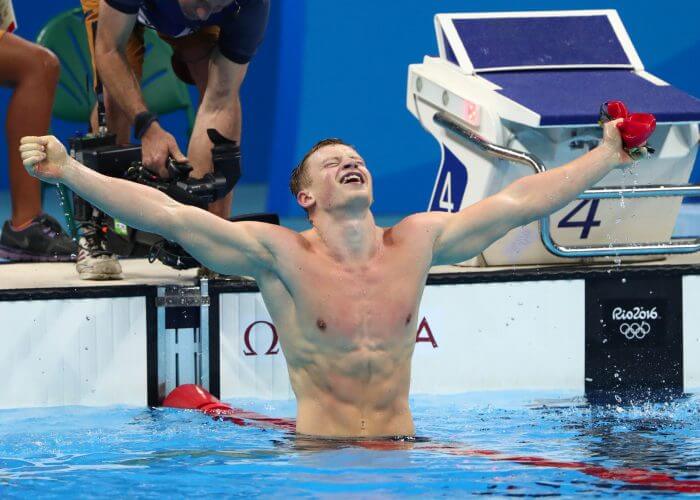
Adam Peaty – Olympic immortality in 57.13sec – Photo Courtesy: Rob Schumacher-USA TODAY Sports
As Peaty hoisted himself on the lane rope and threw his arms to the heavens in celebration, Marshall sat high in the stands in tears, relief her overwhelming emotion.
It was some time before she saw the 21-year-old who placed his gold medal around her neck stating it’s “50% yours”.
Marshall had coached Peaty since he was 14 when he walked through the doors at the City of Derby club and the pair had now reached the pinnacle, adding Olympic gold to his world, European and Commonwealth titles.
Later that night Marshall sent a text message to Peaty which she shared with Swimming World.
It read:
“As the sun sets on the history you have made, enjoy every second. Breathe it in and know that it’s yours forever.
“I have seen many from this point lose sight of who they are through success. Promise me one thing: stay true to who you are, continue to be a son your mum will be proud of, a friend your friends can rely on and a role model for the sport we are lucky enough to work in at the highest level.
“You have the potential to do great things in this world, go beyond the norm and potentially shape great change.
“I am so proud of all you have achieved, this moment will lie with me as one of my most special moments in my whole life. I thank you for being all that I ask and doing all the challenges set with your greatest effort.
“It’s been an honour. Well done, Olympic champ.”
Hope, Despair And Trauma
Rewind to April 2004 and the Great Britain Olympic trials at Ponds Forge in Sheffield, northern England.
It was a meet that hinted at good things to come for the British team in Athens four months later.
Marshall set two British records in the 200m freestyle with her time of 1:57.51 catapulting her to the top of the world rankings.
She also set a national record of 54.62 in the 100m, a mark that would stand for three years.
Exhilaration was mingled with happiness at seeing her mother and her best friend’s parents in the crowd.
Also looking on was her close friend Daniel, who died two years ago after living with a severe muscular dystrophy condition, but who followed Marshall to all her big events.
“It’s the people that excites and I just remember being so proud at what I’d done but also so proud that people in the audience were my friends and my family.
But come the Games in August and that optimism had turned to dread, intense training had left her feeling drained and ill-prepared for the biggest competition of all.
She recalls:
“I just didn’t feel I was ready, I felt quite frightened about it. I felt like training hadn’t gone as well as I had liked it to go.
“I just felt overwhelmed. I was aware that in the arena I would be in, I couldn’t arrive in that place where I hadn’t had the perfect preparation.
“I just wanted it to be over.”
Marshall qualified from the 200 heats but had no illusions about what lay ahead.
“I was going to attack the 200 free semi but I knew I didn’t have the gas to do it, physically I just wasn’t going to be able to do it but I was just like ‘well better go out fighting’.
“I think I went out like a bull in a china shop which wouldn’t have been a problem because that’s how I swam it and went 1:57.5 but I just didn’t have any gas left.”
Marshall was 16th in 2:01.06 and didn’t compete in the 100 although she was part of the 4×100 free and 4×200 quartets that finished sixth and fifth respectively.
The British team came away with two bronze medals courtesy of David Davies, whose national record of 14:45.95 still stands today, and Steve Parry in the 200 fly.
“I pushed, pushed and pushed and we were all on this mission to make it better and ultimately I think some of us arrived at the Games a little bit over-cooked,” Marshall reflects.
“No-one’s fault, I don’t blame anybody, there are some elements of responsibility I need to take.
“If I had just consolidated I might have swum the same time and been Olympic champion.”
The team left Athens immediately to compete at a short-course meet in Manchester, Marshall relieved to be home among those who loved her.
While in Manchester, she was consoled by Eileen Adams, coach to Hannah Miley, David Carry and Robbie Renwick among others – a trio with an array of Olympic, world, Commonwealth and European medals.
“I remember her sitting on the poolside with me and she put her arm around me and said ‘out of everybody I know in your career you’ve been through the most and you’ll come through this and be fine, just take time’.
“And I needed to hear that. Sometimes you need people to step up around you and I just was like ‘that’s all I needed to hear’.
“I knew I was going to go on but it just took time.”
For months Marshall was deeply wounded and questioned whether she could again take that risk – as all athletes do – of being vulnerable to such despair.
“I went into a very dark place. I was confused, I was hurt, I was anxious. I was quite depressed about the whole thing.
“I wasn’t quite sure I wanted to be exposed like that and hurt like that again.
“The first three months it felt like the whole world stopped and I just felt like I didn’t want to get back into training, I think I was very hard work and wasn’t motivated like I had been before. I was really frightened about how I felt.
“It’s a trauma: it’s an investment of 15 years, your life and soul on the line, it’s physical stress every single day, it’s a push, a push, a push.
“When it didn’t come off for me it was a significant trauma. A real big part in my life and some of those wounds took a long time to heal.
“Through my swimming career I don’t think some of them ever did heal.”
She knew she had more to give though and with gradual healing over time and the support of her coach Ben Titley at Loughborough and the help and guidance of others around her, Marshall returned.
Returning To The Podium Before Trials Turbulence
The years following Athens saw Marshall heal some wounds and make numerous trips to the international podium.
In March 2006 she won four silver and two bronze medals at the Commonwealth Games in Melbourne, bettered only by Siobhan O’Connor among British women who claimed gold among her six-strong haul in 2014.
Marshall then swam the lead-off as the British team won the 4×100 medley relay plus bronze in the 200 backstroke at the 2006 European Championships in Budapest.
Come Olympic year and there was a relay silver at the Europeans in Eindhoven in March weeks before the British trials, again at Ponds Forge.

Photo Courtesy: Mel Marshall Twitter @massivemel
By then 26, Marshall knew it was to be her final Olympics but there was more turbulence ahead.
“As an athlete I think I went through pretty much everything you can go through,” she says.
“I got told in a room for Commonwealth Games in 1998 the team was 41 and I was the 42nd and my mate was 43rd, I didn’t get taken to the European Championships, I was 15 at worlds in 98, off and on funding, extreme highs and lows.
“And been sat outside the call room when someone had to walk past me and tell the officials I wasn’t in the call room and knew exactly who I was but didn’t think to say are you coming in. I was in plenty of time.”
In an incident etched on the memories of many – including Becky Adlington – Marshall was waiting outside the call room where swimmers assemble ahead of the 100m free.
Despite being there for 25 minutes, the fact she wasn’t actually inside meant she was not allowed to race and although she could appeal, she chose to focus on the 200 free, also aware of the effect postponing the 100 would have on the other swimmers.
“I lost my marbles. The night before the 200 free my friend had come to stay and I remember lying in my bed shaking and thinking I don’t know if I’m going to make this. What if I don’t? The pressure was on so much.
“I’d come to the point in my career when there’s a changing of the guard, the new generation are on the way and I was hanging on. I was physically really ill. The person I was with at the time was holding on to me because I was shaking.
“I chatted to a sports psychologist in between the heat and the final and they processed everything for me and I worked it out. I was like ‘Mel, you can do this, take the expectation, it’s a logical process, you’ve got this’. And I snuck in on fourth spot.”
Bound For Beijing, Relay Agony And Retirement
Marshall arrived in Beijing knowing this would be her final competition. Not for her continuing for another four years to compete at a home Games in London.
A winner by nature, she wanted to go out in a good place and she knew it was her time.
She anchored the British 4×100 free quartet to seventh as they set a national record of 3:38.18 with Marshall splitting 54.55.
And next up was the 4x200m freestyle in which Britain had a strong first-choice team of Marshall, Adlington and Jo Jackson – gold and bronze-medal winners respectively in the 400 free – and Caitlin McClatchey, double Commonwealth champion.
When Marshall walked out on pool deck at the Water Cube it was with a feeling of calm as she embraced the arena and the occasion.
“I remember having this amazing song on by Beth Orton.
“I looked up for the first time and I remember thinking if I’d known what I know now and I had the physical opportunity that I had in Athens I would definitely be Olympic champion because I was like ‘Mel this is not such a big deal’.
“I’d worked through a lot of issues and mental challenges like self-doubt.
“And I remember being so free and I was so happy – I was like ‘this isn’t as big a deal as you’ve made it, it’s just swimming, it’s four lengths of the baths, you know what you’re doing so go on and have a go at it’.”
But things did not go according to plan as Britain were locked out of the final – as detailed in Swimming World’s piece with Adlington, who was rested along with McClatchey.
“I was stood with Jo Jackson holding her hand watching us come ninth with Adlington and McClatchey rested and we knew we had about 4.5secs to bring in. That was it.”
And that was it. Marshall’s final race of a career that started at the 1995 European Youth Olympics in Bath, south-west England, where she won four gold medals aged 13 and had taken in five Olympic finals and world, European and Commonwealth medals.
She recalls: “I remember Ben (Titley) coming up to me and hugging me and saying ‘I’m sorry’. It sounds weird but that meant a lot to me.
“I remember swimming down and thinking ‘you know what, I’m alright with it.
“’I’ve done all I can do, I’ve lived every moment, I’ve given it my best and you know what? I haven’t won them all but I’m still a good person and I’m still on a hell of a run’.
“In that moment I felt the proudest I’ve ever felt even though I wasn’t going to get the opportunity.
“I remember Ross Davenport and Dave Carry coming to find me after the heats and we sat under these lights in the Olympic Village and we just sat there for hours talking. It was nice to have them turn up for me.”
Wheels Set In Motion As Peaty Arrives
Following retirement, Marshall became head coach at City of Derby and a meeting with a mortgage advisor was essentially life-changing.
The mortgage advisor had a son, Kyle, who swam at the Dove Valley club in Uttoxeter in the English midlands.
Kyle had a friend at the club called Adam who also came along and the wheels were set in motion.
Fourteen when he joined City of Derby, Peaty didn’t impress Marshall with his freestyle but when he started doing breaststroke she knew immediately he was special.
It was late 2012/early 2013 when Marshall made what appeared to be a bold prediction at Derby one day to Davenport, the double Commonwealth champion who had recently retired.
“I remember being stood on a poolside when he was about 18 with Ross and I said ‘Ross, I’m telling you now, this kid is going to win an Olympic medal’.
“Then I remember standing at the BSCA (British Swimming Coaches Association) conference and giving a talk about his journey from 1:14 to 59.
“He went 59.9 when he was 18 and I stood in this room saying ‘this boy is going to swim 57’ and there was a bit of a murmur. I had no doubts.
“Then when he went 57 I had no doubts he would go 56.”
History Rewritten And Rio Awaits
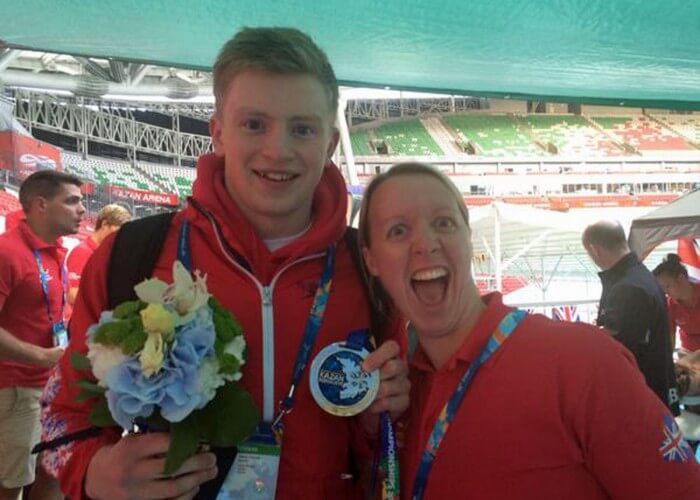
Melanie Marshall with her charge Adam Peaty – Photo Courtesy: Melanie Marshall/Twitter
In April 2015 Peaty did indeed go 57 when he set a new world record of 57.92 at the British Championships, in the same lane of the Aquatics Centre where Cameron van der Burgh had stopped the clock at 58.46 en-route to Olympic gold in 2012.
Later that year he became a triple world champion at the World Championships in Kazan, Russia, while adding the 50 world record to his 100 mark.
The only title missing from his armoury was the Olympic one and expectation had soared as had intense media interest.
Marshall set about getting him accustomed as much as she could for what he may expect in Rio.
“The whole thing was about simplifying his execution of racing.
“We did lots of things in training which in my mind was so he would feel comfortable with what he do from a process point of view.
“I recorded the audio from the world champs and we played that to him every week so he could hear what it was to have his name (when he was) coming out.
“We did a set every Wednesday morning where he would listen to the names and what it sounded like with the crowd so it felt like he’d walked out there a thousand times.
“I just kept it simple and I think if you role model that you are in control they’ll feel like you are.
“I kept it what it was about – let’s enjoy it. We’ve worked hard, let’s see what we get and what we can do.”
Before leaving for Rio, Marshall filmed a video message for Peaty which featured family, friends and team-mates. All those who had played some part, however big or small, in his journey.
“We had the heart of a community supporting us and I did this montage for him. I got all the club there, those on his journey, and I got his family and gran in the room with everyone saying goodbye and good luck and he cried, bless him.
“There were messages from people he used to swim against. All the pics of when he couldn’t do a crunchie or a press-up, taken across the years.
“It came to him that I’ve done alright here: I’ve come a long way.”
The team went to the holding camp in Belo Horizonte, Brazil, where Peaty confided in Marshall.
“We were sat at this idyllic spot and he goes ‘I’m really nervous’ and I went: ‘have you ever thought you’re nervous because you know what you can do?’
“And he was like ‘yeah, that might be what it is’.
“Then it turned from nerves to excitement. ‘You’re right to be nervous mate because you know what you’re capable of and that’s exciting. So just try and keep a lid on it. Try and keep it ready for when you need it and go from there’.”
Things didn’t run smoothly though as Peaty’s bags containing technical kit and clothing went missing on arrival in Rio. Not that it affected the swimmer.
“We’d had this mantra of anywhere, anytime, let’s just do it.
“We’d gone through those things of unpredictability so he was walking around the village in the t-shirt he travelled in for three days.
“He had a rash on his armpit and he was like I don’t care, bring it on. He almost embraced that difficulty and saw that as a real opportunity. How do I handle this? Send it to me.
“I was rushing round like a blue-arsed fly trying to get his technical kit and stuff. From that adversity he grew bigger. Challenge.”
While some can shrink in the glare of the Olympics, Peaty embraced it.
A world record of 57.55 in the heats was followed by a semi-final of 57.62 and all eyes and all expectation were on the swimmer from Uttoxeter to claim Britain’s first medal of the Games.
Marshall walked with him to the call room and recalled her final words.
“He says I looked a bit nervous when I left him. I probably did.
“Bill Furniss (GB head coach) had this thing about burn your boats. If you’re going to go out, go out in style and do it how you want to do it.
“I’d had a whisper to him about that. I just tried to keep him on task. I said something like use your speed with a great stroke and use your back end for a great stroke and then for Queen and country on the last 25 or something like that.”
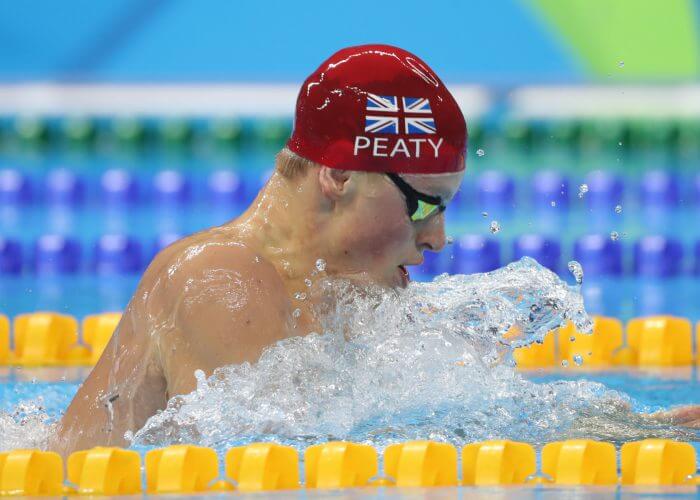
Photo Courtesy: Erich Schlegel-USA TODAY Sports
She headed up into the stands.
“I wanted to have that moment where it was just my moment. I love doing that.
“That’s my moment, that’s what you work hard for.
“People ask me now what’s your best moment? It’s not actually when he won, I thought it was but that was just relief. It’s actually the excitement and anticipation of what is he going to do here?
“And that little bit of worry.
“I was like ‘don’t fall in’ – he didn’t fall in. ‘Don’t do a one-handed touch’ – didn’t do a one-handed touch.
“And as soon as that first 50 was out of the way I was like ‘fine, he’s going to tear it up. He’s going to go’.
“It was such a great moment.”
As Peaty celebrated and spoke to the massed press, Marshall was in tears, feeling an enormous sense of relief.
“It felt like I’d fought every battle for him, I’d fought every battle to prove that impossible was possible and I’d worked every hour that God sent.
“There wasn’t anything I felt I’d left untouched and I felt I’d done everything I could for him. In that moment I felt it was all worth it.”
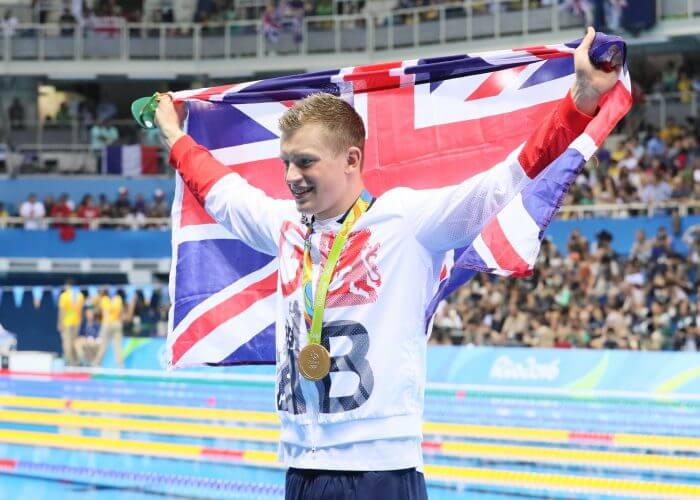
Photo Courtesy: David E. Klutho-USA TODAY Sports
She didn’t see Peaty for quite a while and has little recollection of what they said or did at that time – “we probably had an awkward hug.”
Crystal clear though is the memory of him placing his medal around her neck.
“I’m not bothered about the accolades that come with it.
“All I ever do it for is so they know you’ve worked for them and they understand that.
“And that to me – I’d not just helped him as a swimmer, I’d raised him to be aware enough to know I was there for him 100% all the way.
“I didn’t want the medal around my neck, I was quite embarrassed about that – it was just the fact he had acknowledged I was in his corner the whole way and we’d done it together. That was very special for me.”
How much of your experiences and the lessons learned from the highs and lows of your career have you passed on to Adam and made him what he is today?
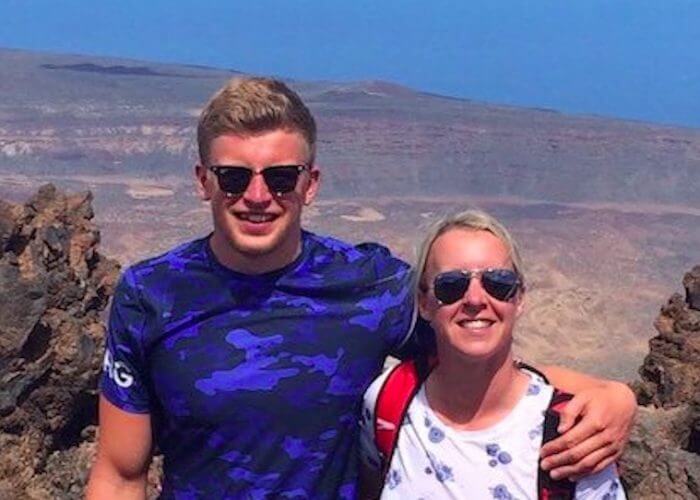
Mel Marshall and Adam Peaty – Photo Courtesy: Mel Marshall and Adam Peaty
“From an arena skills and performance, everything I went through,” she says.
“I give lots of speeches and put two photos together – one of me crying after Athens and one of him winning.
“There is no way that I’d have been able to handle the pressures that you handle when you’ve got an athlete like that and protect him and allow him to have a really nice experience if I’d not lived through it myself.
“That learning experience and I felt like I’d missed out but hopefully through that I’ll be able to support and protect the athletes to be able to deliver their best performance in that environment.
“Adversity is our greatest opportunity and if you ask me would I want to be Olympic champion or would I have wanted to coach the Olympic champion and I could only pick one, I would have wanted to coach the Olympic champion.
“It’s so much more fulfilling, I am proud of every win I had in sport and I am just as proud of every loss because I became bigger through every experience.”
Women In Her World
Marshall comes from a family of strong women and on International Women’s Day she pays tribute to her mother and grandmother.
“My gran could do anything, she could make anything. When I played cricket with her in the summer in her back garden I used to hit the ball too hard so she made a wool ball. Things like that. Badminton racket, lacrosse, made a wigwam, roller-skates, the whole lot.
“My mum has been incredible really. She’d hate me for saying it but I owe everything to her because she went and sat in those crap seats at the Coventry pool for hours and I did what kids do which is bugger off and not going and see her.
“I remember us being stuck in Macclesfield after I’d done a biathlon and we were stuck in the Peugeot 205 snowed in on the road. My dad as well he did all the lifts but my mum was the emotional rock really.
“She always let me live my life and she’s always encouraged me to live my best life and I always have.”



